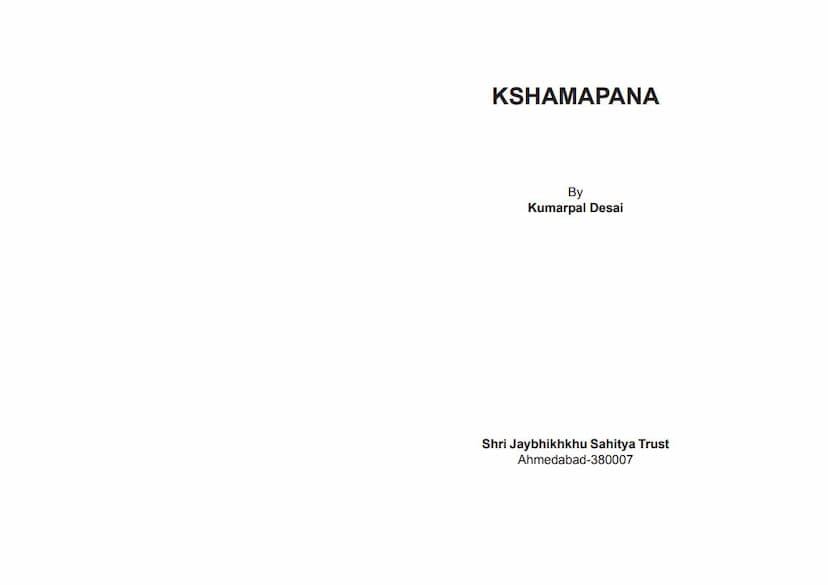Kshamapana
Added to library: September 2, 2025

Summary
Here's a comprehensive summary of the Jain text "Kshamapana" by Kumarpal Desai:
Core Message:
"Kshamapana" is a profound exploration of forgiveness (Kshama) within the framework of Jain philosophy and practice. It emphasizes that true forgiveness is not merely a formality but a deep, heartfelt quality that purifies the soul and leads to spiritual liberation. The book highlights the significance of forgiveness, particularly during the Paryushana festival, and delves into its practical application, its importance in overcoming negative emotions like anger, and its transformative power.
Key Themes and Concepts:
-
The Essence of Forgiveness: The book opens with the foundational Jain mantra: "Kshamapana, Khamemi savve jiva, savve jiva khamantu me; Miti me savvabhuesu, veram majjha na kene'i." This translates to: "I ask all sentient beings to forgive me my misdoings. May all sentient beings forgive me my offenses. I love all sentient beings. I bear animosity towards none." This sets the tone for the core message of universal love and the importance of both seeking and granting forgiveness.
-
Paryushana and Samvatsari: The text links "Kshamapana" directly to the Paryushana festival, the most significant Jain religious observance. The seven days of penance and introspection culminate in the Samvatsari day, the day of asking for and granting forgiveness. This period is presented as an opportunity for spiritual purification and the settling of accounts for the year's deeds.
-
The Inner Search and Self-Reflection: "Kshamapana" stresses the importance of looking inward during this period. It likens the purification of the soul to a clear, cloudless sky after rain, where the "rainbow lines" of lust, anger, pride, and conceit are washed away. The book urges readers to examine their own faults and to move beyond superficial penitence to a genuine commitment to self-improvement.
-
The Folly of Material Attachment: A central allegory is the story of the man who lost 999 rupees for a cowrie, illustrating how misplaced desires and attachments can lead to immense loss. Bhagavan Mahavir uses this to show how humans often lose their valuable souls (like the 999 rupees) for trivial worldly pleasures or anger (the cowrie).
-
Overcoming Anger: A significant portion of the book is dedicated to analyzing anger. It describes anger as a destructive force, comparing it to fire that consumes the individual and their surroundings. The text outlines the stages of anger and provides examples of how it can lead to self-destruction, citing the stories of Chandakaushik and a blacksmith's rage. It contrasts uncontrolled anger with the ability of "gentlemen and great men" to transform anger into tranquility.
-
Humility in Forgiveness: The text emphasizes that true forgiveness requires humility. It uses the example of Indrabhuti Gautama, Bhagavan Mahavir's chief disciple, who humbly asked forgiveness from a layman, Ananda, when he realized he had made a mistake. This highlights that true greatness lies in acknowledging errors and seeking reconciliation, regardless of social status or intellectual prowess.
-
The Nature of True Forgiveness vs. Formal Forgiveness: The book distinguishes between "Dravya Kshama" (formal forgiveness) and "Bhava Kshama" (experiential forgiveness). Formal forgiveness, like saying "sorry" or sending a card, is seen as superficial and often a matter of habit. True forgiveness ("Bhava Kshama") comes from the heart, involves the tranquilization of negative passions, and is practiced by those with genuine insight.
-
Forgiveness as a Virtue and a Path to Liberation: Forgiveness is portrayed as a mine of all virtues. It is seen as a strength, not a weakness, and is equated with the earth's forbearance. The text suggests that embracing forgiveness leads to contentment, simplicity, modesty, and control over the senses, ultimately paving the way for spiritual emancipation.
-
The Power of Forgiveness to Transform: The book provides numerous examples of individuals who demonstrated profound forgiveness, such as Draupadi forgiving Ashvatthama, King Udayan showing mercy to Chandapradyota, and Bhagavan Mahavir enduring immense suffering without retaliating. These stories underscore the transformative power of forgiveness in resolving conflict and achieving inner peace.
-
Forgiveness in Jain Philosophy: The text explains that Jainism places a unique emphasis on seeking forgiveness from all souls, not just a divine being. It also categorizes forgiveness into different types, such as upkara-kshama, apakara-kshama, and vipakakshama, and highlights that the highest form, "sahaja-kshama" (natural forgiveness), easily leads to emancipation.
-
The Role of "Pratikramana": The book links forgiveness to the ritual of "pratikramana" (repentance and confession). It explains that pratikramana, along with atonement, is essential for returning to the righteous path and that confession of sins, followed by a vow not to repeat them, is crucial for true forgiveness.
In essence, "Kshamapana" is a guide to understanding and practicing the transformative power of forgiveness. It encourages readers to cultivate a forgiving heart as a cornerstone of their spiritual journey, leading to inner peace, positive relationships, and ultimately, liberation from the cycle of suffering.